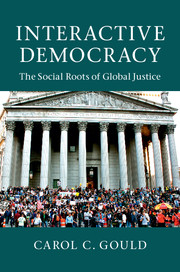Book contents
- Frontmatter
- Dedication
- Contents
- Acknowledgements
- Introduction
- Part I A theoretical framework
- Part II The social roots of global justice
- 5 Transnational solidarities
- 6 Does global justice presuppose global solidarity?
- 7 Recognition and care in global justice
- 8 Gender equality, culture, and the interpretation of human rights
- 9 The sociality of free speech: the case of humor across cultures
- 10 Violence, power-with, and the human right to democracy
- Part III Interactive democracy – transnational, regional, global
- Works cited
- Index
- References
10 - Violence, power-with, and the human right to democracy
Published online by Cambridge University Press: 05 September 2014
- Frontmatter
- Dedication
- Contents
- Acknowledgements
- Introduction
- Part I A theoretical framework
- Part II The social roots of global justice
- 5 Transnational solidarities
- 6 Does global justice presuppose global solidarity?
- 7 Recognition and care in global justice
- 8 Gender equality, culture, and the interpretation of human rights
- 9 The sociality of free speech: the case of humor across cultures
- 10 Violence, power-with, and the human right to democracy
- Part III Interactive democracy – transnational, regional, global
- Works cited
- Index
- References
Summary
Introduction
We have described some positive normative directions that are enabled by globalization’s facilitation of communication across borders. But equally striking is its facilitation of transnational forms of violence. Over the past period, we have witnessed salient examples of transnational violent terrorist attacks, as on 9/11, as well as transnational responses to them via the introduction of a coordinated security apparatus and the extension of forms of militarization across borders. Numerous other globalized forms of violence also permeate contemporary politics, including the proliferation of private military firms, transnational criminal and sex trade networks, and new forms of war-making tied to global economic and political processes.
In this chapter, I want to consider how our conceptions of power and democracy can be expanded in order to better counter these forms of transnational violence. The empirical democratic peace hypothesis – that democratic states tend not to go to war against each other – is often introduced as evidence to support democratization as a way to mitigate violence between nation-states. But it is not clear whether or how such a hypothesis could apply to more transnational forms of violence, carried out especially by nonstate actors. Moreover, the conceptual interrelations that underlie this peace hypothesis and especially the connections between power, democracy, and violence are not well understood.
- Type
- Chapter
- Information
- Interactive DemocracyThe Social Roots of Global Justice, pp. 179 - 194Publisher: Cambridge University PressPrint publication year: 2014



